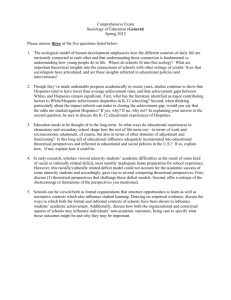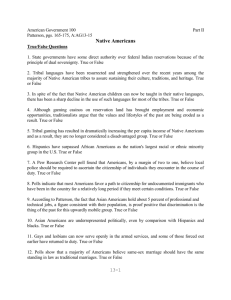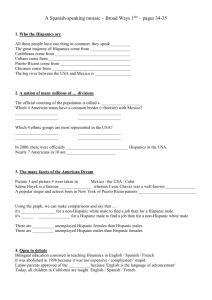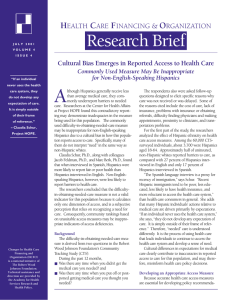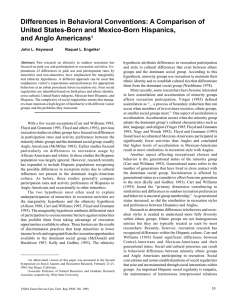Statewide Surveys of Hispanic Voters in Florida
advertisement
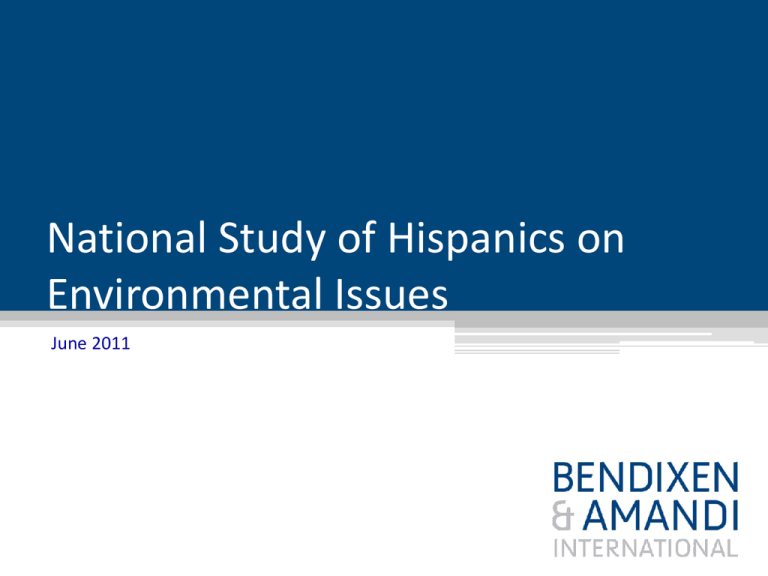
National Study of Hispanics on Environmental Issues June 2011 2 Methodology Sample size 1,000 Hispanics nationally Over-samples in Florida, Colorado, New Mexico, and Nevada Dates of interviews March 20-30, 2008 Margin of error +/- 3 percentage points Languages of interviews English, Spanish 3 Major Findings 4 Major Findings • When it comes to the environment, most Hispanics think air and water pollution is the most important problem for them and their family. • Most Hispanics are not aware of any toxic sites close to their home or workplace. • Almost all Hispanics interviewed believe that outdoor activities are important to them and their families. 5 Major Findings • The most popular outdoor activities among Hispanics are going to the beach and exploring national parks. • Almost one-third of Hispanics say they prefer to go fishing in lakes, and most of them prefer to go with a family member instead of friends or co-workers. Hispanics also have a tendency to eat what they catch. 6 When it comes to the environment, which are the two most important problems to you and your family? (Allow for two choices) 51% Polluted air and water 43% Energy and global warming 17% The destruction of our wilderness… 14% Toxic waste sites 12% Toxic lead and mercury poisoning 1% Something else 2% Don't know/ No answer 0% 20% 40% 60% 7 Are you aware of any toxic sites close to your home or place of work, such as a refinery, a chemical plant, an incinerator, an agricultural field, a major highway, or a factory? 34% Yes No 66% 8 How important are outdoor activities – like fishing, hunting, camping or visiting national parks – to you and your family? 70% 61% 60% 50% 40% 27% 30% 11% 20% 1% 10% 0% Very important Somewhat important Not important Don't know/ No answer 9 Which are the two most popular outdoor activities of your family? (Allow for two choices) 36% Going to the beach 31% Exploring national parks 27% Picnics 20% Fishing 17% Camping 10% Hiking 6% Something else 4% Hunting 1% Don't know/ No answer 0% 5% 10% 15% 20% 25% 30% 35% 40% 10 How often do you go fishing? 49% 50% 40% 30% 20% 21% 19% 10% 10% 1% 0% Very often Once in a while Very seldom Never Don't know/ No answer 11 Where do you fish? (Asked only of respondents who fish “very often” or “once in a while”) 50% 39% 40% 32% 24% 30% 20% 5% 10% 1% 0% Lake Ocean River Somewhere Don't know/ else No answer 12 Who do you go fishing with? (Asked only of respondents who fish “very often” or “once in a while”) 30% Son/ Daughter 22% Friends 14% Other relative 9% 9% 8% Other person Father/ Mother Brother/ Sister 2% 2% 1% 3% Co-workers Cousin Aunt/ Uncle No answer 0% 5% 10% 15% 20% 25% 30% 35% 40% 13 Do you eat the fish that you catch? (Asked only of respondents who fish “very often” or “once in a while”) 1% 23% Yes No Don't know/ No answer 76% 14 Why This is Significant 15 Why This is Significant • The EPA’s proposed strong new air quality standards for life-threatening hazardous air pollution from power plants, including mercury, is progress, however, there is still not much signage in waterways advising fishermen of these new standards. The survey demonstrates the need for signs in English and Spanish to warn Hispanics of this potential hazard, since one-third of them fish on a regular basis, and the vast majority of those eat what they catch. Even though the survey was taken in 2008, the findings remain accurate because they measured habits which rarely change over such a short period of time. 16 Demographics 17 Age 50% 40% 30% 30% 25% 28% 17% 20% 10% 0% 18 to 34 years old 35 to 49 years old 50 to 64 years old 65 years old or over 18 Gender 47% Male 53% Female 19 Language of Interview 37% Spanish English 63% 20 Region 60% 50% 37% 36% 40% 30% 19% 20% 8% 10% 0% West South Northeast Midwest 21 Annual Household Income 60% 50% 40% 37% 36% 30% 19% 19% 20% 8% 10% 0% Less than $25,000 $25,000 to $50,000 $50,000 to $100,000 $100,000 or more No answer


